"Refund Only" Nurtures the Flower of Evil: "Tutorial on Profiting from Refunds" Booms, Dark Industries Multiply
![]() 07/24 2024
07/24 2024
![]() 697
697
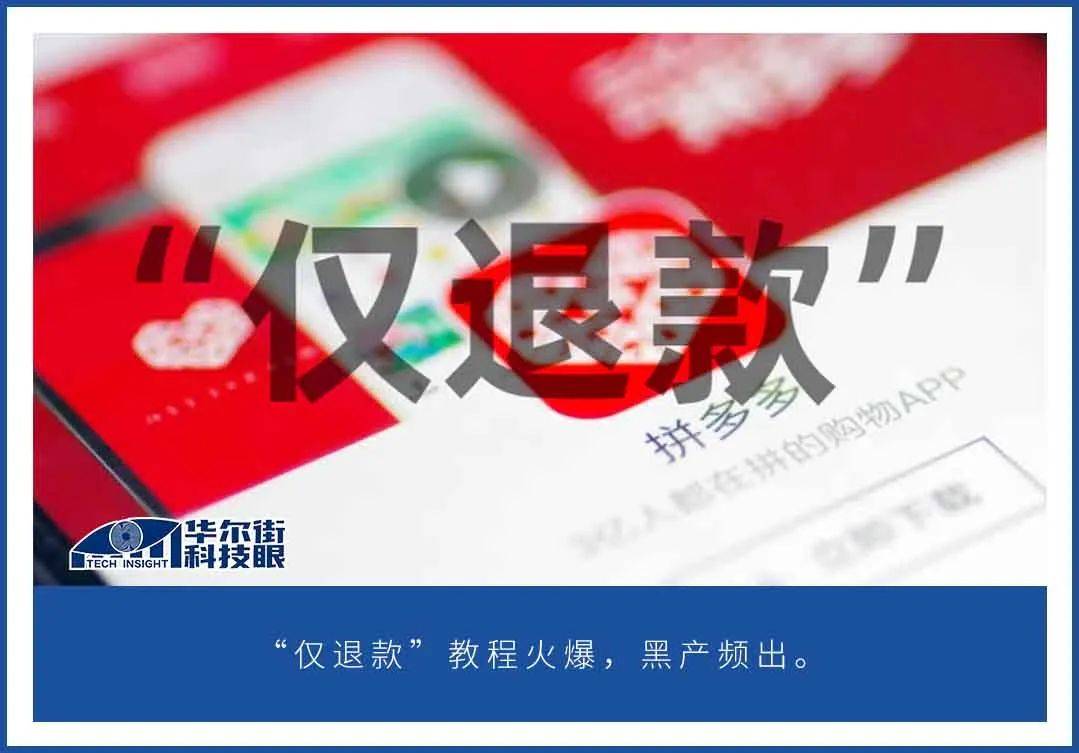
By Leon
Edited by cc
Innovations in e-commerce platform rules can give birth to new industries, models, and drivers, serving as a key to improving the business environment. However, rules that deviate from their original intentions have given rise to a series of gray industries that skirt the law and openly trample on the dignity of the law in e-commerce. Pinduoduo's pioneering "Refund Only" policy, which has deviated from its original intention at the implementation level, has become an "unbearable burden" for merchants.
Amid declining consumption, the e-commerce platform business has become increasingly competitive. According to StarChart data, during the 2024 6.18 shopping festival, the total GMV across the entire network was 742.8 billion yuan, a year-on-year decrease of 7%. To attract users, major platforms and live streaming e-commerce continue to innovate their after-sales policies.
The "seven-day no-reason" return policy, originally intended to provide convenience for users, has been exploited to the extreme by "refund profiteers." Recently, a women's clothing online store in Zhejiang experienced concentrated returns, with over 400 worn dresses that could not be resold, resulting in a loss of nearly 8,000 yuan. In fact, during this year's "6.18" shopping festival, some merchants reported that the return rate during the promotion period had reached as high as 80%.
The seven-day no-reason return policy has already caused great suffering for merchants, and even worse is the prevalence of the "Refund Only" policy. Pinduoduo introduced the "Refund Only" policy in 2021, and by the end of last year, multiple platforms announced their follow-up. It took just over half a year for the policy to transition from being highly praised by the media and the public to being lamented by merchants and seeing a surge in related consumer dispute lawsuits.
Many small and medium-sized merchants on e-commerce platforms have reported frequently encountering "Refund Only" orders with a variety of reasons, ranging from "don't like it" to even "don't have money."
Policies such as "Refund Only," "seven-day no-reason return and exchange," and "mandatory shipping insurance" were originally intended to enhance the shopping experience, protect consumer rights, and improve operational efficiency for merchants. However, due to platform favoritism and laziness, these rules have become a shelter for refund profiteers.
Worse still, there are those who make a big deal out of the return policies in e-commerce channels, with related dark industries that profit from refunding emerging endlessly. Major merchants have been forced to take legal action to protect their rights, significantly increasing operating costs.
Dark Industry of "Profiting from Refunds": Refund Only, "Profiting from Deposits," Earning Over Ten Thousand a Month
When the "Refund Only" policy was first introduced, it did not cause widespread dissatisfaction among merchants, as there were only a few individual "refund profiteers." However, once malicious refund-only behavior becomes large-scale and part of the dark industry, quantitative changes lead to qualitative changes.
Dark industry practitioners, through trial and error and inference, have even "developed" various refund-only methods, attracting some consumers with low moral standards to profit from them.
Some netizens told the media that someone in their shopping group was selling so-called "Refund Only Tutorials" for various e-commerce platforms, guaranteeing success for a price of 5 yuan. These tutorials include detailed written and video instructions, mainly teaching related phrases and using a tough attitude to threaten merchants to achieve a refund only.
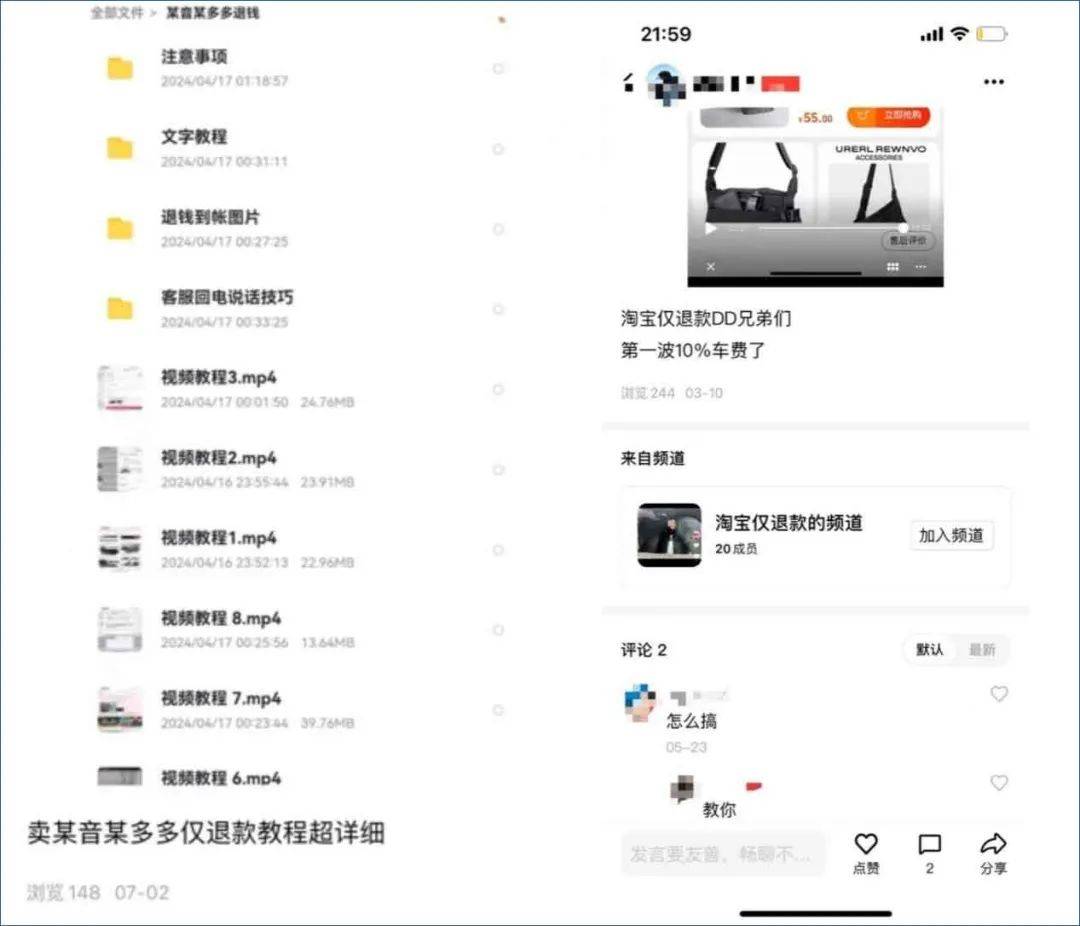
Image: "Refund Only Tutorial" circulating online
In fact, such simple tutorials are just the tip of the iceberg of the dark industry, with more professional "foodie groups." During the 2019 Singles' Day, a reporter from Xinmin Weekly went undercover in multiple QQ groups and exposed the operation of the malicious refund-only dark industry. These refund profiteers, who call themselves "foodies," often act in groups. Their specific operation involves applying for a refund only after receiving the goods, effectively getting items for free.
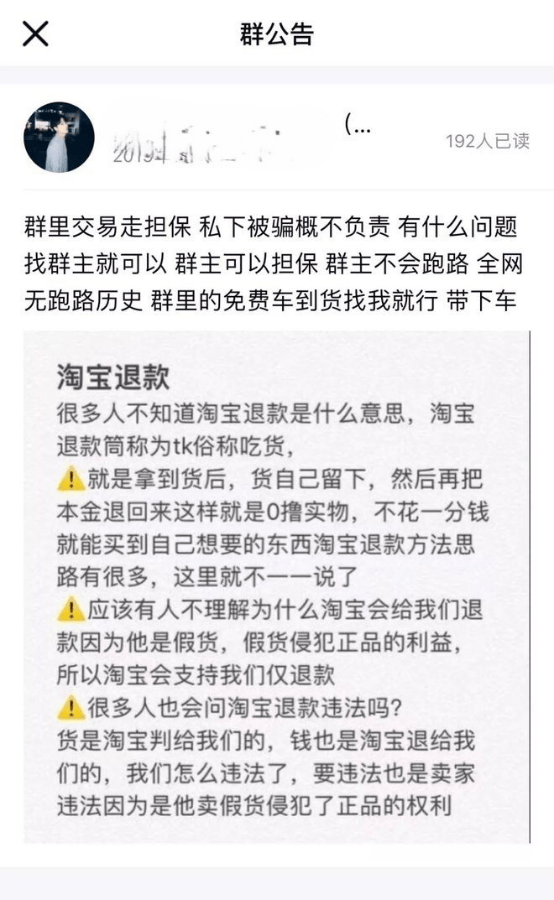
The "foodie groups" initially targeted some platform merchants selling branded counterfeit products, such as Adidas or Nike brand counterfeits (so-called "Putian shoes"). After selecting a merchant, the group leader organizes fans to purchase goods in bulk, then applies for a refund only after receiving them, using reasons such as "bought fake goods." If the merchant does not agree, they threaten to file a complaint and demand "one fake, ten compensations." Since the merchant is in the wrong, they often choose to compromise.
While counterfeiters may not deserve sympathy, as the "foodies'" appetites grow, even legitimate and compliant merchants cannot escape. For example, when purchasing a carton of milk, the foodies might damage one box and make a mess, taking photos and sending them to customer service to create the illusion of poor packaging or damage, or they might Photoshop images of expired expiration dates for beverages and foods to apply for a refund only.
"Profiting from refunds" can not only get things for free but even earn money. According to media reports, in June of this year, Ms. Lin's Taobao bracelet store was targeted, and the store, which had been closed for three years, suddenly received over 200 orders. "Because we couldn't fulfill the orders, the system deducted our deposit and compensated buyers with over 3,000 yuan," said Ms. Lin. She immediately contacted platform customer service to appeal, but was told that the appeal was invalid due to the merchant's own reasons for not operating.
The key to such operations is to find stores that have not operated for years. If there are unlisted products in the store, one can purchase them and apply for compensation due to the merchant's long-term failure to ship, with amounts ranging from tens to 100 yuan. This money is actually the deposit paid by the merchant to the platform. It is reported that e-commerce platform deposits vary by category and amount, typically ranging from 1,000 to 10,000 yuan.
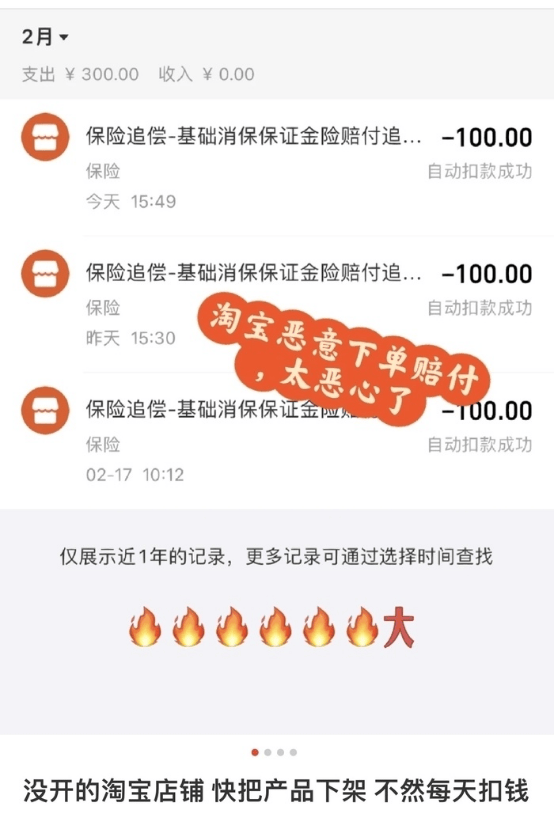
The top earners in the dark industry have a pyramid scheme-like approach. Their profit methods are mainly divided into two types: "taking disciples" and "sharing targets." Professional dark industry practitioners are more experienced, with certain "tricks" in both operating methods and selecting stores. They may even develop specialized tools like "dead store collectors" to improve screening efficiency. To learn from these groups, fans must either pay "disciple fees" ranging from hundreds of yuan or buy a single target store link for tens of yuan. It is understood that there are ways to obtain compensation from Taobao, Kuaishou stores, Meituan takeout, Pinduoduo, and Ctrip hotel bookings, with many "refund profiteers" earning over ten thousand yuan a month.
Do You Need a Legal Counsel to Open a Store on Pinduoduo?
The various "refund profiteering" tactics have caused great suffering for small and medium-sized merchants on e-commerce platforms, with those on Pinduoduo feeling it the most acutely. As a result, merchants have chosen to unite and fight back, coming up with various ways to reduce refund-only behaviors, but the actual results have not been good.
A Pinduoduo merchant said that they noted on their packages: "Abide by platform transaction rules, and abnormal after-sales will be entrusted to a law firm for full agency." However, a fellow merchant commented, "I also wrote that, but I was warned by the platform! If I don't correct it, they will freeze my funds and impose a triple fine!"
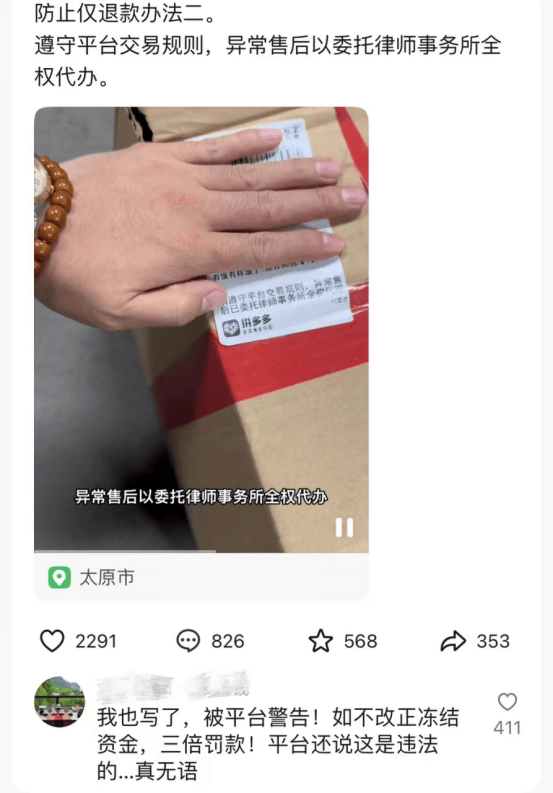
Some merchants share online store backend settings, hoping to automatically block unreasonable refund-only operations by changing return policies. For example, Pinduoduo's backend allows creating return rules such as "Refund automatically after refusing delivery of shipped goods," and similar operations are also allowed on Taobao, Douyin stores, etc. However, if platform customer service intervenes, all preset rules become ineffective.
In desperation, some merchants have chosen to take legal action against consumers who maliciously request refunds only. Merchants share online the process of filing a lawsuit, which can be done through the "People's Court Online Service" WeChat mini-program or the app of the same name, and provide templates for the statement of claim.
Recently, a "Refund Only" dispute case was quickly mediated by the Public Security People's Court of Zhongshan County, Hezhou City, Guangxi Zhuang Autonomous Region. In the end, the consumer, Mr. Wu, realized that his behavior of "Refund Only without Returning Goods" violated integrity and agreed to refund the 11.96 yuan of goods and bear 800 yuan in litigation-related expenses.
In fact, the number of consumer dispute cases has been increasing year by year in recent years. During this year's 3.15 period, the Beijing Internet Court released the trial situation of consumer dispute cases: As of December 31, 2023, the Beijing Internet Court had accepted a total of 23,792 cases involving the online consumption field, including 679 cases related to "seven-day no-reason return" consumer disputes. The court found that one of the reasons for the surge in such cases was consumers applying for seven-day no-reason returns or even refunds only after using goods for free for a short period.
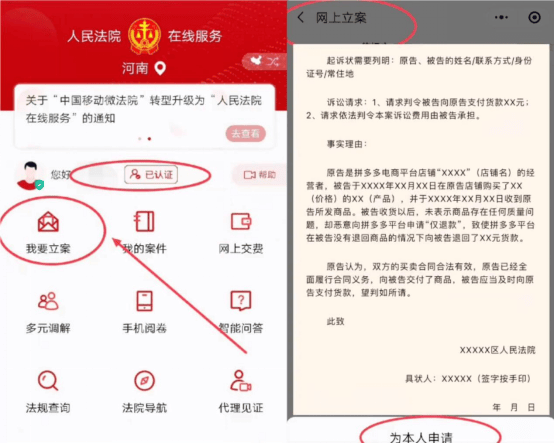
For small and medium-sized merchants, they naturally cannot afford to hire professional legal teams to handle disputes. In trade disputes, defining whether the buyer has "subjective malicious breach of contract" is often the key, and most merchants still need to seek the help of professional lawyers, incurring costs such as attorney fees. If the court does not support all the merchant's claims (such as requiring the defendant to pay attorney fees), even if the merchant wins, they may still lose money in the end.
"Refund Only" Lawsuits Are Difficult to Win, but Merchants Want to Fight for Justice
Currently, there are no definitive statistical data on the adjudication of "Refund Only" cases on the internet, but through some representative cases, we can roughly infer the court's judgment tendency.
The party mentioned above who purchased clothing for 11.96 yuan was ultimately ordered by the court to refund the merchant's payment and bear the reasonable expenses of 800 yuan incurred by this rights protection action. In fact, for merchants, this is already the best possible outcome.
However, Mr. Pan, who operates a tissue paper business, was not so lucky. According to Red Star News, Yunnan merchant Mr. Lian encountered the same buyer twice requesting a "Refund Only," with reasons of "not receiving the goods" and "goods spoiled," but refused to return the goods. Mr. Lian demanded that the buyer refund the payment and apologize in writing, but the court only supported the refund and rejected the apology request.
Similar to many other cases, consumer Ms. Wang disagreed with the merchant on the quality of the goods and sought help from platform customer service, who directly processed a refund only for Ms. Wang without returning the goods. Ms. Wang believed that since the platform had agreed to a refund only, why should the merchant still bear the shipping cost to return the goods. Judge Yin Siyuan of the Shilipu Tribunal of the Hanyang District People's Court in Wuhan ultimately ruled that Ms. Wang had breached the contract and compensated the merchant 49.72 yuan for the goods. At the same time, the court issued a judicial suggestion to the platform, requiring it to improve the refund-only rules, establish a credit evaluation mechanism, and strengthen publicity and guidance to ensure that merchants' interests are not infringed upon.
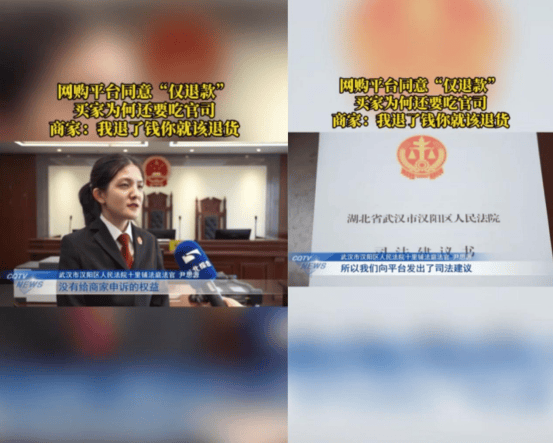
Mr. Wang, who operates an infant food business in Shandong, is a "tough guy" in e-commerce. Over the past year, he has sued about 30 consumers for "Refund Only," with a win rate of about half. Of course, the process is full of hardships, such as encountering buyers with fake names and incomplete addresses during evidence collection, leading to obstacles in litigation. Even so, Mr. Wang insists on filing lawsuits, "Many of us merchants file lawsuits because we want the court to know about this situation and draw more people's attention to this phenomenon," he said.
Based on the above cases, supported by existing legal provisions and precedents, the court is more inclined to determine compensation for the goods' value but does not support claims for the defendant (consumer) to bear attorney fees, litigation fees, or penalties. Professional lawyers have some insights on this.
Gao Yandong, Director of the Internet Law Research Center at Zhejiang University Guanghua Law School, believes that typical "Refund Only" behaviors involve exploiting loopholes in rules, playing on the edge, and involving small amounts, making criminal and administrative accountability difficult.
Zhu Pingsheng, a lawyer at Shanghai Junyue Law Firm, said that China's current laws on the supervision of online dark industries have not been detailed, and it is subjectively difficult for law enforcement authorities to distinguish between malicious refunds and other behaviors.
In other words, it is difficult to establish claims of "fraud" or "unjust enrichment" in such cases, which are more often recognized as "consumer disputes."
Zeng Yu, a lawyer at Sichuan Zongmu Law Firm, believes that a better solution would be to start with the platform. He believes that e-commerce platforms lack hard standards when handling buyers' "Refund Only" requests, such as serious quality issues or discrepancies between goods and descriptions, often relying on communication records between buyers and sellers, big data capabilities, or platform habits to execute, leading to blurred judgment boundaries.
At this point, the core of the "Refund Only" contradiction has become very clear. Why do e-commerce platforms condone unreasonable "Refund Only" behaviors?
Behind Pinduoduo's Forced "Refund Only"
In 2021, Pinduoduo took the lead in introducing the "Refund Only" policy, aiming to simplify the refund process and enhance the consumer experience. The introduction of the "Refund Only" policy can serve as a warning and deterrent to merchants on the merchant side, as if they do not comply with the rules, they simply give up a portion of their profits to consumers; on the user side, Pinduoduo gains a reputation, killing two birds with one stone.
In 2024, "Refund Only" has become a standard feature of e-commerce, with platforms such as Taobao and Douyin following suit.
E-commerce platforms tend to favor consumers when handling "Refund Only" orders. Taking Pinduoduo as an example, its customer service will intervene forcefully in negotiations and directly help buyers obtain refunds only, while merchants need to bear all the losses. From the cases, we can also find that the amounts of refunded goods are not large, and they mainly involve small and medium-sized merchants.
Why not flagship stores or large merchants? In fact, platforms like Heimao Complaints have numerous complaints about e-commerce platforms not fulfilling "seven-day unconditional return and exchange" policies, most of which involve flagship stores or big brands, indicating that platforms cannot influence the after-sales behavior of big brands to a certain extent.
Thus, we can conclude that "Refund Only" is more targeted at small and medium-sized merchants and white-label products. Pinduoduo, which relies on white-label and low-cost products, has rapidly risen to become one of the top three e-commerce platforms in China, with a total market value now comparable to Alibaba. Pinduoduo's rule bias inevitably raises suspicions of backstabbing.
So, isn't Pinduoduo afraid of losing merchants? In fact, in the Chinese market, the number of white-label merchants is huge and highly replaceable, and merchants are mostly in a strong position in buying and selling relationships, so they dare not confront Pinduoduo.
Based on previous experiences, even when white-label sellers unite, they cannot create a significant impact. Previously, when Pinduoduo's strategy started to favor flagship stores and brands, white-label sellers banded together to "protest," but Pinduoduo responded firmly and did not make concessions to the white-label sellers.
Of course, balance is required for any situation. When black-market activities emerge and the threshold for "milking the system" gets lower, the originally healthy commercial ecosystem is disrupted. Even worse, bad money drives out good; other platforms, if they can't compete, might choose to join in, such as Taobao.
On July 15, Taobao adjusted its "AliWangWang Usage Management Guidelines." The new rules stipulate that if sellers exhibit behaviors such as not responding, not replying, or having a poor attitude, Taobao will support buyer compensation based on 20 yuan per incident, according to buyer complaints. For severe cases, sellers will be penalized with A2 points. This rule will gradually take effect starting July 22, 2024.
After the release of this rule, some Taobao sellers expressed dissatisfaction. Some predict that black-market operators and "coupon hunters" will target stores with insufficient staff or those that have not been active for a long time, exploiting the "chat insurance" until the store's security deposit is depleted. Some netizens believe that this rule is beneficial for consumers as it can regulate the attitude of store customer service and gradually phase out poorly managed stores, thereby improving the shopping experience on Taobao.
Currently, Pinduoduo has no intention of modifying its "refund only" policy, and there are no indications that any mainstream e-commerce platform is establishing mechanisms like consumer credit scores to limit malicious "refund only" behavior. However, with the surge in such cases, regulatory authorities have taken notice of the related issues, and new laws and regulations are in the pipeline.
New Regulations Expected to Improve "Refund Only" Chaos
In May of this year, the State Administration for Market Regulation issued the "Provisional Regulations on Online Anti-Unfair Competition" (hereafter referred to as the "Regulations"), which will come into effect on September 1.
The "Regulations" consist of five chapters and impose more detailed anti-unfair competition constraints on e-commerce platforms and merchants. Article 2 mentions that operators are prohibited from engaging in online unfair competition practices that disrupt market competition order, affect market fair trade, and harm the legitimate rights and interests of other operators or consumers.
Article 24 stipulates that platform operators shall not use service agreements, transaction rules, and other means to impose unreasonable restrictions or attach unreasonable conditions on transactions, transaction prices, and dealings with other operators within the platform. This includes signing exclusive agreements, unreasonably setting security deposit deductions, reducing subsidies, and other unreasonable restrictions or conditions.
Article 25 states that platform operators must fairly and reasonably determine charging standards in service agreements and transaction rules. They shall not violate business ethics or industry practices by charging unreasonable service fees to operators within the platform.
Although these three new regulations do not specifically mention "refund only," they do clarify, to some extent, the obligations of platforms towards merchants, stating that they should not affect fair trade or harm the rights of operators. Industry insiders believe that fostering malicious "refund only" behavior should also be considered as "affecting market fair trade" or "imposing unreasonable conditions on platform operators."
Of course, the "Regulations" also impose constraints on merchants. Article 9 stipulates that operators shall not engage in false or misleading commercial practices, such as fabricating transactions, transaction amounts, sales volumes, falsely claiming goods are in stock, and creating fake user reviews.
The new regulations aim to regulate unfair competition behaviors in the online retail industry from multiple dimensions, striving to protect consumer rights while ensuring a fair and orderly business environment. If strictly enforced, these regulations will greatly help address various issues currently plaguing the e-commerce market.







